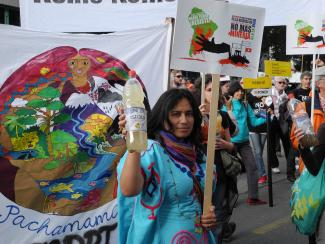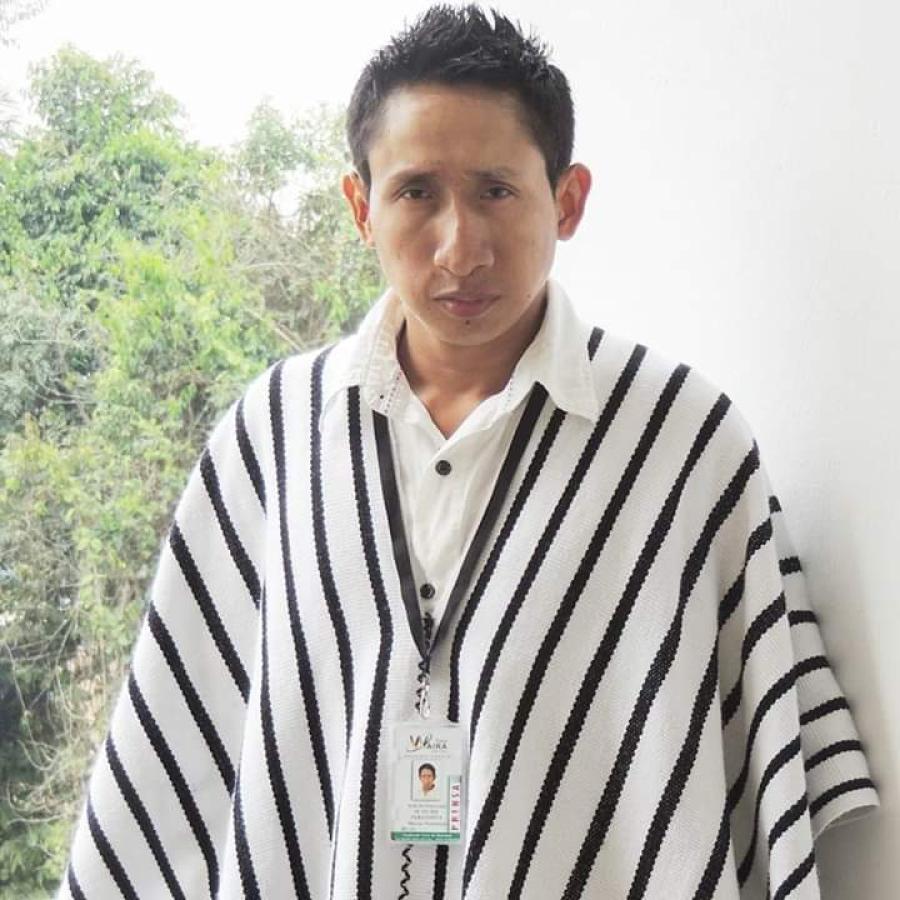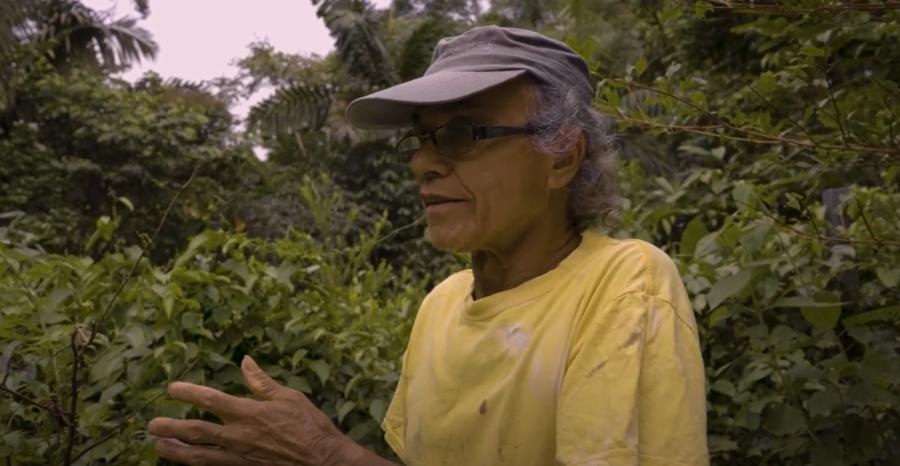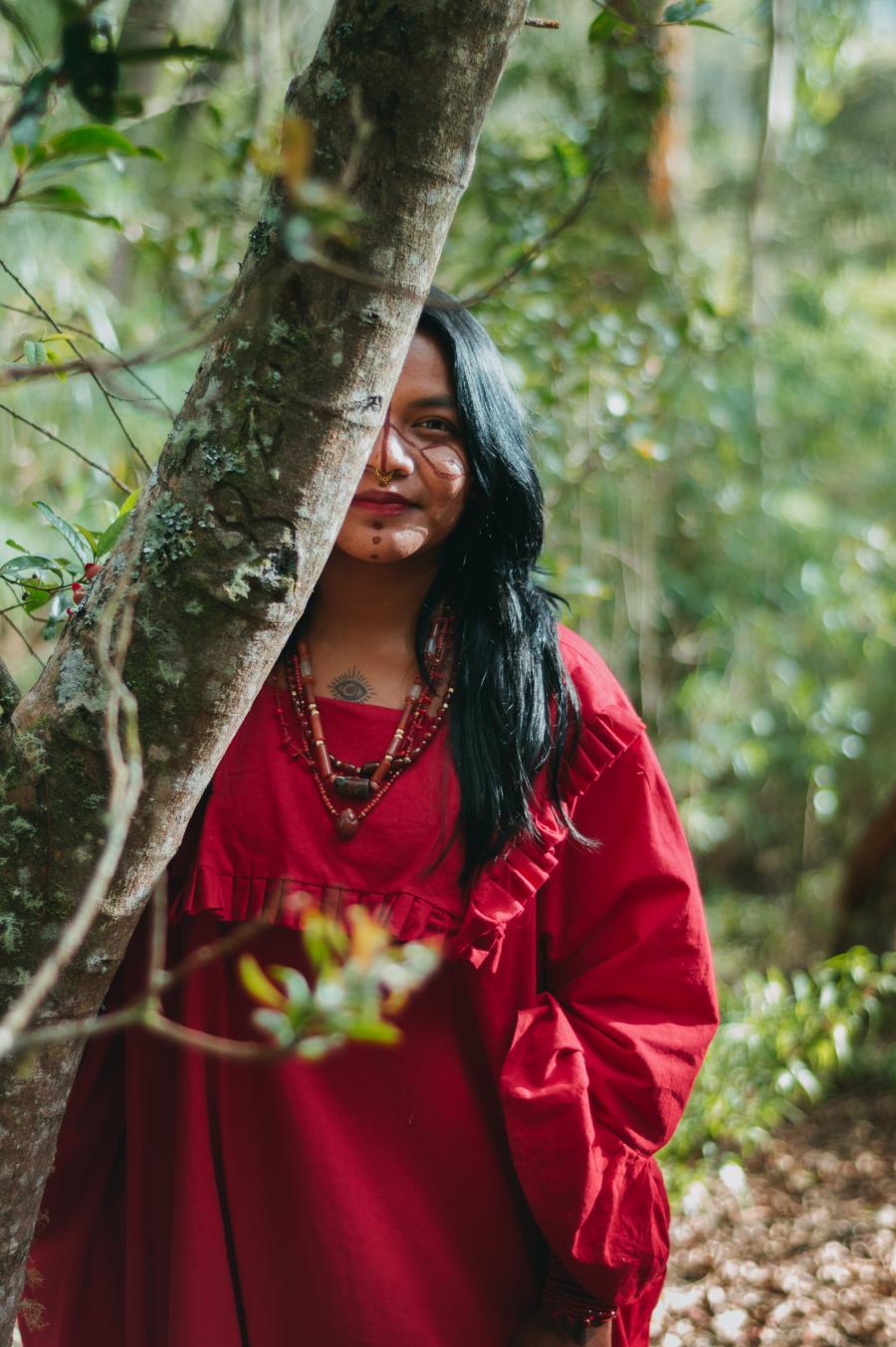In the fictional world of James Cameron’s Avatar, Pandora’s Indigenous Na’vi people defend their sacred territory against mining encroachment amid overwhelming odds. At stake is their intimate and unique relationship with the land, their way of life, and their ability to decide what kind of future they want for themselves. It is a story that Cultural Survival board member Karmen Ramírez Boscán and her Wayúu people understand well, because they grapple with these realities every day.
As a young woman, Karmen never imagined she would be at the front line of this battle, advocating for and educating fellow Wayúu about their rights. Her childhood spanned two worlds— the Indigenous Wayúu territory of La Guajira, Colombia until age nine, and from then on, Bogotá. Though Karmen was instilled with Wayúu values and returned to her native land for vacations, her growing Spanish language facility, form of dress, and educational attainment all underscored the urban identity she was assuming.
Then, following the completion of her university degree in 1998, Karmen returned to La Guajira to write her grandfather’s biography. The visit opened her eyes to her roots, to relatives she wanted to know better, and to injustices meted out by the Colombian government to her people. In 2000, her grandfather and uncle were murdered by Colombian armed forces. Karmen began documenting subsequent murders and disappearances, led her people in demonstrations against military and mining presence, and became an outspoken critic of the human rights abuses internationally. She stresses that she neither leads nor represents the views of all Wayúu, but acts to counter armed forces and multinational corporations that many abhor. Her work persists today despite death threats from Colombia’s paramilitaries. “My dead relatives and all ignored victims of this horrendous armed conflict deservejustice,” she says resolutely.
The Wayúu of Colombia boast over 270,000 people spread across some 8,000 square miles and approximately 23 clans. They have endured historic human rights abuses in the form of violent incursions from Colombia’s guerillas and paramilitaries. In the 1980s, a new front of human rights abuse was forged when Colombia entered into an agreement with Exxon endorsing their development and extraction of coal from La Guajira’s El Cerrejón Zona Norte, one of the largest open pit mines in the world.
The playing field should have changed significantly after Colombia ratified the International Labour Organization Convention 169 in 1991, which specifies that Indigenous Peoples are to “participate in the formulation, implementation, and evaluation of plans and programs for national and regional development which may affect them directly.” The dynamic should have shifted even more dramatically after Colombia endorsed the UN Declaration on the Rights of Indigenous Peoples in April 2009, which stipulates that Indigenous Peoples must have exclusive decision-making authority over development activities on their territory through free, prior and informed consent (FPIC). But Colombia has failed to live up to these standards, and the long-standing procedure whereby companies obtain permissions, licenses, and property in La Guajira from the Colombian government without the prior knowledge of the Wayúu people endures today.
El Cerrejón, the dominant multinational mining corporation in Wayúu territory, has attempted to legitimize their operations and gain communal support through ex post “consultations” that are consultations in name only. They are co-opted by such strategies as excluding traditional authorities and holding one-on-one meetings with individuals who might be persuaded to serve as company interlocutors. These actions undermine communities' abilities to deliberate together, reach a consensus, and act in unison.
Drawing on its vast financial resources, El Cerrejón projects a very favorable image of itself and its work during the consultations that masks the negative realities of mining. Feel-good television commercials, social responsibility development project promises, and compensatory offers of money, goats, and handicraft fabric are pitched to win audiences over. When necessary, these devices are augmented by threats and harassment.
Once operations break ground, the communities experience a devastating interplay of environmental, health-related, social, economic, and cultural consequences. Coal dust pollutes their air, limiting their ability to grow traditional foods, contaminatingm their water and remaining vegetation, and threatening their children with respiratory damage. Property appropriations to the companies for extraction and coal transport obstruct communication and trade between communities and leave insufficient land for animal grazing. Increased militarization of the land further stifles the Wayúu people’s freedom of movement. Their burial grounds, with long-standing sentimental, spiritual, and social significance, may be displaced, sometimes along with the community itself. As the extraction continues, communities increasingly realize that they may not be able to safeguard their territory for future generations.
Karmen works to empower fellow Wayúu in conjunction with Fuerza de Mujeres Wayúu (Wayúu Women’s Force— FMW), a local organization that jointly combats mining encroachment, violence against Indigenous women, and crimes against Wayúu by legal and illegal armed actors. Their workshops provide a constructive atmosphere for communities to identify and document how extraction has impacted them, as well as a medium for the transmission of concrete information to communities about their human rights (particularly to FPIC). Karmen has also led fellow Wayúu in demonstrations against these rights abuses on every 25th of November since 2006 (International Day for the Elimination of Violence against Women), emphasizing the devastation mining has caused Wounmainkat (Mother Earth), “the biggest Indigenous woman.”
Their desire to demonstrate, she emphasizes, is a “big success” in and of itself. Though FPIC would provide the Wayúu with the best possible leverage for engaging multinational corporations, many communities possessing solid confidence in their negotiating abilities and only a limited understanding of their rights settle for much less than that to which they are entitled. Karmen’s work with the FMW seeks to counterbalance the asymmetrical relationship between businesses and Wayúu communities by equipping her people with every tool at their disposal. But the FMW’s ability to access, offer sustained and constant education to, and unify all the communities to fight effectively for FPIC has been severely limited by financial resources, the vastness of the region, and time. With two new state-endorsed multinational mining corporations poised to expand the extractive operations in La Guajira, the workshops are more urgent than ever.
The recent emergence of national and international NGOs concerned with the challenges facing the Wayúu offers a much-needed expansion of capacity and resources. Yet their exclusive emphasis on empowering Wayúu to negotiate more effectively rather than reorienting the people’s mindsets to one of rights-based change ultimately provides them with “help,” says Karmen, when what they really need is “support.” A recent and more promising exchange between Wayúu communities and Guatemalan Mayans adept at managing the community consultation process to reinforce their right to FPIC provided important comparative information and support. But Karmen believes it also highlights the current limitations of external organizations and actors in affecting change. “The reality is that the companies are the only [constant] … in the territory. After the meeting the communities [were] alone [again] … [T]he fact that the … support [from NGOs and other international actors like the Mayans] is [overwhelmingly] external and not permanent in the communities” needs to change.
Though Karmen believes it will take years to reach all the communities and unify them in a collective fight for their rights, she hopes they will one day bring their case to the Inter-American Court of Human Rights, which has already made favorable judgments on similar disputes. For now, she is sustained by the same determination that has long characterized her Epinayu clan. Her work, and its underlying message of courage, dignity, and hope, continues on.
Erica Jaffe Redner is a research assistant at Harvard University and an intern at Cultural Survival.




